TWENDE on the road to success!
TWENDE is building a model to increase effectiveness of implementing health research innovations. Using the implementation of tuberculosis (TB) molecular diagnostics, we are investigating the implementation barriers and ways to unlock them and make implementation a success. Released on World TB day (24th March 2017), the results of Kenya national TB survey revealed higher prevalence than previously reported (https://ke.usembassy.gov/pr-03242017/). The report highlights the use of microscopy as the main tool for TB diagnosis to have missed many TB cases resulting in under reporting of the disease burden. The findings of this survey reaffirm the need for effective implementation of innovative diagnostic tools to reach the communities that most need them. TWENDE’s mission is to ensure that health research innovations are translated into policy and practice and are effectively implemented.
Dr. Wilber Sabiiti, the co-ordinator of TWENDE consortium has recently completed the TWENDE site monitoring visits in Kenya, Tanzania and Uganda and witnessed the great progress made. The TWENDE teams have been exploring the state of TB diagnosis and treatment through online survey of the county and or district medical officers and healthcare facility audits for implementation of TB diagnostics, Xpert MTB/RIF and Line probe assay. Over 70% of the survey and audits are complete across the three countries.
Preliminary analysis of the survey responses confirms microscopy as the main tool for diagnosis at 92% coverage almost two times higher than the Xpert MTB/RIF. Under funding is taking the lead as the main issue for low implementation of Xpert MTB/RIF. Other key issues are procurement difficulties, insufficient human resource and lack of awareness. Absence of utilities such as electricity and water is also mentioned. We will further explore these issues using interviews and focus group discussions with healthcare professionals, service users including TB patients and survivors, and policy implementers. Information emanating from these investigations will be used to engage policy makers with a view of developing a model for accelerating the implementation of effective diagnostic and treatment interventions at national and regional levels.
TWENDE Site Progress
Kenya
The Kenya team is led by Kenya Medical Research Institute (KEMRI) centre for respiratory diseases research. The team has completed over 80% of the survey and health care facility audits. They will soon launch the qualitative data collection with interviews and focus group discussions and then policymakers’ engagement workshops in April – June 2017.
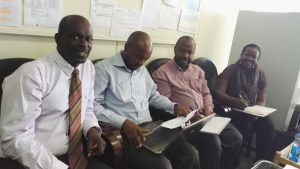
Dr Wilber Sabiiti pictured with the Kenyan TWENDE Team.
Northern Tanzania
The Northern Tanzania team is led by Kilimanjaro Clinical Research Institute (KCRI). The team has completed over 90% of the survey and health care facility audits. They will soon start the qualitative data collection with interviews and focus group discussions aiming to finish end of May and then start policymakers’ engagement workshops in June – July 2017.
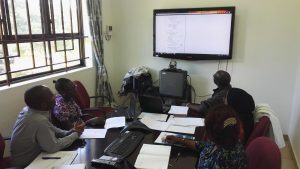
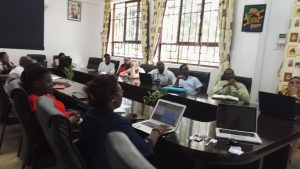
The images above show the Northern Tanzania TWENDE team meeting with Dr Wilber Sabiiti along with the team presenting the preliminary data from healthcare audits.
Southern Tanzania
The Southern Tanzania team is led by National Institute of Medical Research – Mbeya Medical Research Centre. The team has completed over 90% of the online survey and health care facility audits. They will soon start the qualitative data collection with interviews and focus group discussions aiming to finish end of May and then start policymakers’ engagement workshops in June – July 2017
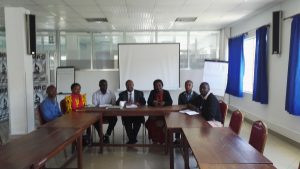
The photo shows the Southern Tanzania team and discussing their progress and TWENDE completion plan with Dr Sabiiti.
Uganda
The Uganda team is led by Makerere University School of Biomedical Sciences in collaboration with CPAR Uganda ltd. The team has completed around 50% of the work and have put in place contingency measures to expedite completion of the work. They will simultaneously conduct online survey and healthcare audits with aim of completing these by 15th April. Shortly after, qualitative data collection led by CPAR Uganda ltd will follow ending in June 2017. July – September will be used for engaging with policy makers.
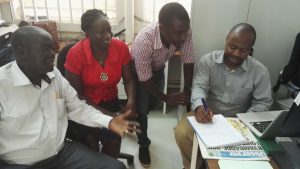
The image left show cases the Uganda TWENDE team at Makerere University discussing their progress and TWENDE completion plan.